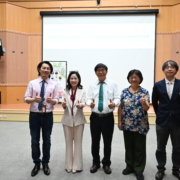【Event Report】 The Health Policy Center held the “From Preventive Medicine to Innovative Long-term Care Models: Strategies and Challenges for Improving Healthy Life Expectancy in a Super-Aged Society” seminar to explore in depth how to effectively reduce unhealthy life expectancy and extend healthy life expectancy in order to meet the challenges of a super-aged society. The Center for Health and Welfare Policy Research at Taipei Medical University held a seminar on “From Preventive Medicine to Innovative Long-term Care Models: Strategies and Challenges for Improving Healthy Life Expectancy in a Super-Aged Society” on Wednesday, May 21, 2025. The seminar discussed in depth how to effectively reduce unhealthy life expectancy and extend healthy life expectancy from four aspects: policy support, clinical practice, academic application, and integration of private resources, in order to meet the challenges of a super-aged society.
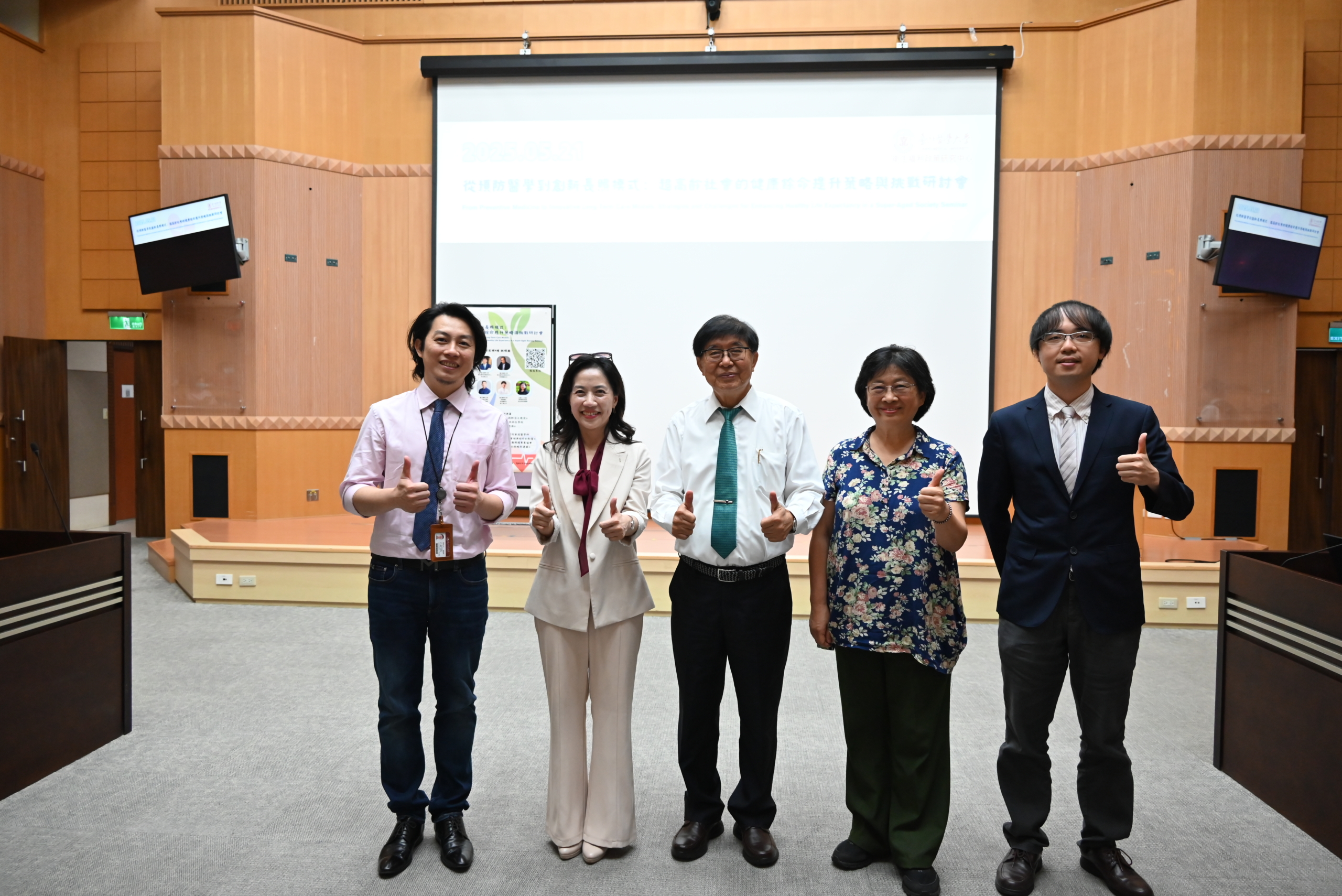
(From left to right: Associate Professor Lo Wei-Cheng, College of Public Health, Taipei Medical University; Deputy Director-General Wei Hsi-Lun, Health Promotion Administration, Ministry of Health and Welfare; Director Lee Po-Chang, Center for Health and Welfare Policy, Taipei Medical University; Executive Director Wu Hsiao-Chi, Taiwan Long-Term Care Professional Association; Director Liao Yi-Hsueh, Department of Family Medicine, Taipei Medical University Hospital)
The Center for Health and Welfare Policy Research at Taipei Medical University held a seminar on “From Preventive Medicine to Innovative Long-term Care Models: Strategies and Challenges for Improving Healthy Life Expectancy in a Super-Aged Society” on Wednesday, May 21, 2025. The seminar discussed in depth how to effectively reduce unhealthy life expectancy and extend healthy life expectancy from four aspects: policy support, clinical practice, academic application, and integration of private resources, in order to meet the challenges of a super-aged society.
Director Lee Po-Chang, Center for Health and Welfare Policy, Taipei Medical University
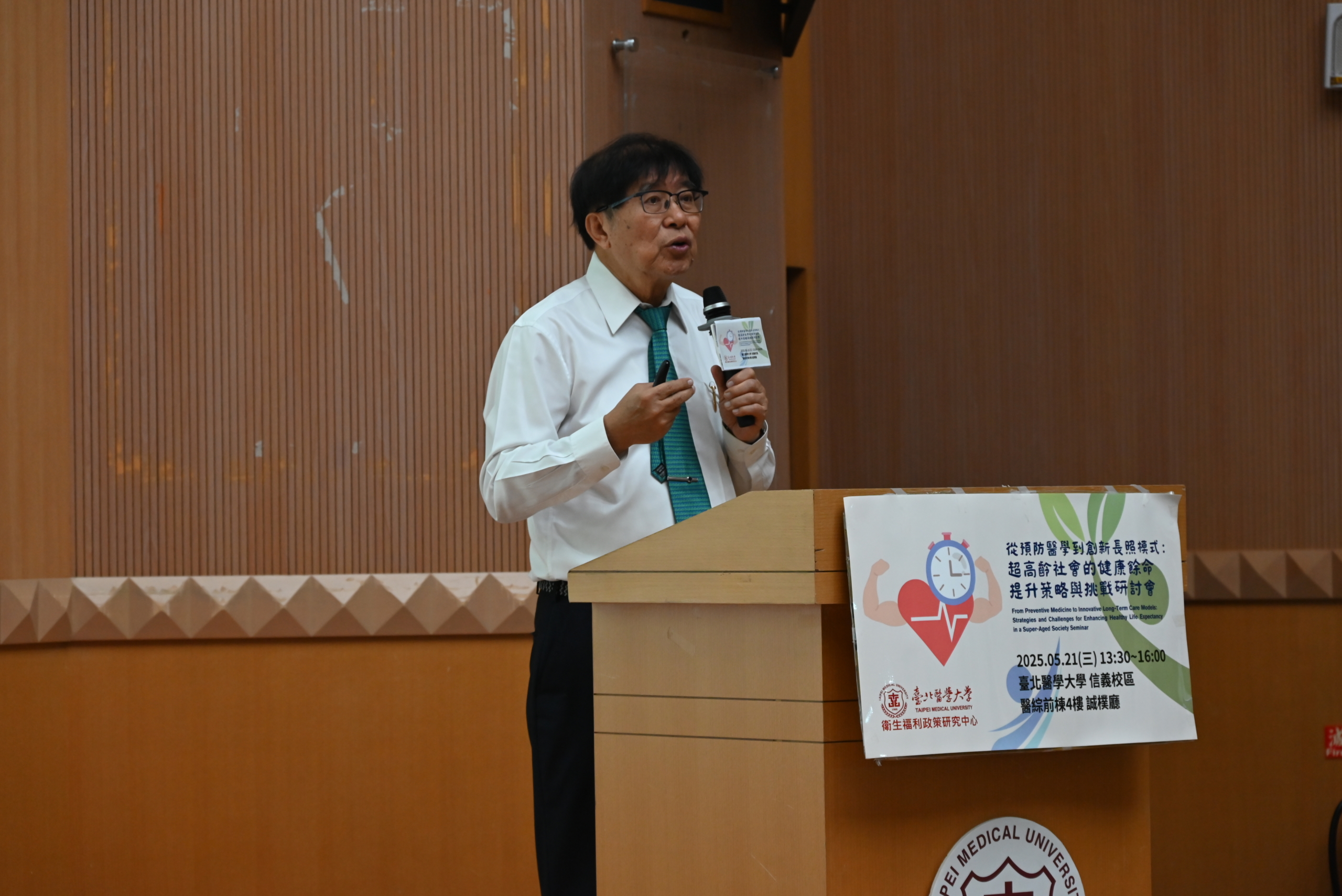
In his opening remarks, Director Lee Po-Chang emphasized that “Healthy Taiwan” is a key policy direction championed by President Lai Ching-te. Compared to neighboring countries such as Japan and South Korea, Taiwan still has a relatively short healthy life expectancy, primarily due to the high prevalence of chronic diseases. Director Lee stressed that unlike acute illnesses, chronic diseases are long-term health issues that most people face as they age. However, statistics show that physicians in hospitals and clinics devote more effort to non-chronic care, which hinders overall health improvement. He pointed out that Taiwan’s National Health Insurance (NHI) system is volume-oriented and lacks sufficient support for the long-term care of chronic illnesses, which is not sustainable in the long run. He expressed hope that this symposium would serve as a platform to brainstorm strategies for improving healthy life expectancy and achieving the national policy goal of a healthy Taiwan.
Deputy Director-General Wei Hsi-Lun, Health Promotion Administration, Ministry of Health and Welfare
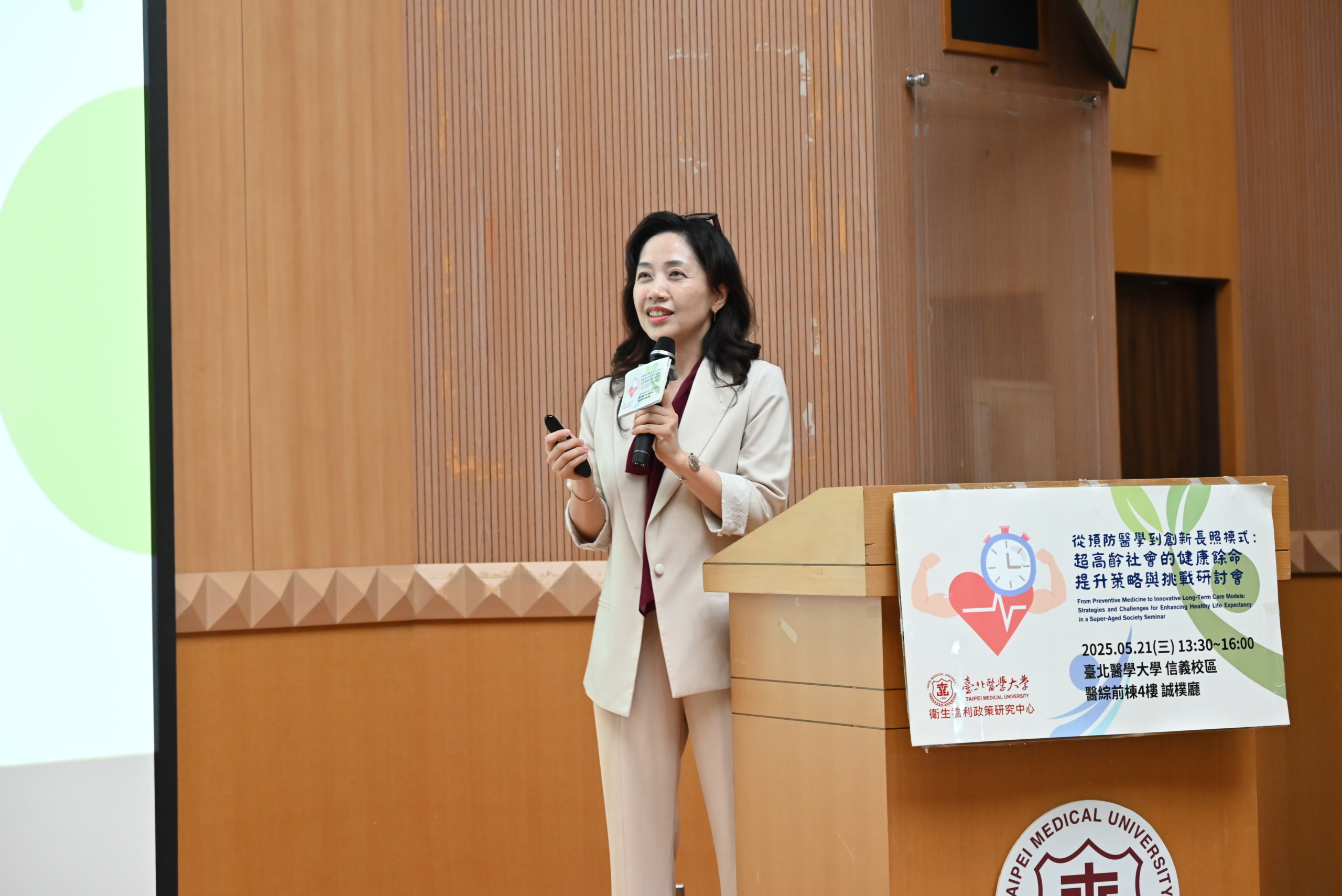
Deputy Director-General Wei stated that 85.9% of Taiwanese aged 65 and over suffer from at least one chronic disease, and the condition is trending younger. Seven of Taiwan’s top ten causes of death, including cancer, are chronic diseases, which also account for nearly 25% of NHI expenditures. Studies have shown that chronic disease patients face a higher risk of death from infectious diseases. Globally, 41 million people die annually from chronic diseases, making them a critical public health challenge. In response, the “Healthy Taiwan Forum” promotes the “888 Strategy” for managing the three highs (hypertension, hyperlipidemia, hyperglycemia): within 8 years, 80% of patients should be enrolled in care programs, 80% should receive lifestyle counseling, and 80% should reach control targets. Strategies are designed for healthy individuals, high-risk populations, and patients with chronic diseases. The current Metabolic Syndrome Prevention Program has registered 300,000 people, with 20% showing initial improvements. To address aging-related health risks, the WHO’s ICOPE (Integrated Care for Older People) framework has been adopted, assessing six domains: cognition, mobility, nutrition, vision, hearing, and mood. Self-assessment tools have been promoted via the LINE platform to enhance health literacy and self-care among older adults. In 2024, 325,000 individuals received ICOPE services, with 43,000 enrolled in follow-up interventions and a 90.5% follow-up completion rate. Wei emphasized the government’s ongoing commitment to promoting lifelong health and aims to reduce deaths from non-communicable diseases and cancer by one-third by 2030 to realize the Healthy Taiwan vision.
Associate Professor Lo Wei-Cheng, College of Public Health, Taipei Medical University
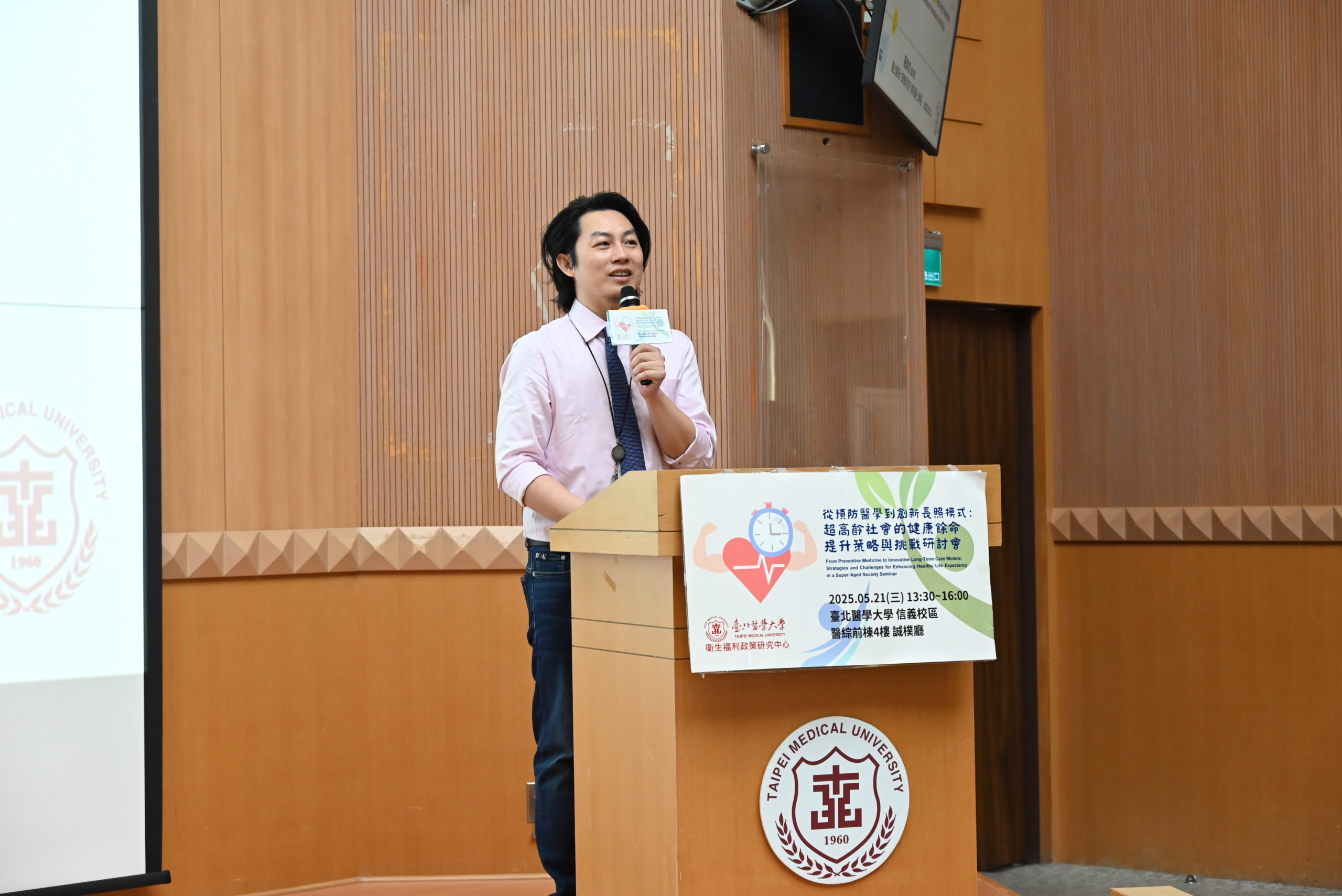
Associate Professor Lo stated that as populations age and the burden of chronic diseases increases, traditional life expectancy is no longer an adequate indicator of health. More comprehensive indicators like HALE (Healthy Life Expectancy) and DALY (Disability-Adjusted Life Years) should be used to reflect health loss and quality of life across the lifespan. HALE represents the number of years lived in good health, while DALY integrates years lost due to premature death and disability, providing a more evidence-based foundation for preventive medicine and policy-making. Lo shared two key research findings. First, five healthy behaviors—no smoking, avoiding excessive drinking, regular exercise, sufficient fruit and vegetable intake, and maintaining a healthy weight—can extend life by seven years, with fruit and vegetable intake having the greatest impact; these behaviors also reduce medical expenses by nearly 30%. Second, a study on PM2.5 revealed that air pollution significantly shortens healthy life expectancy among those over 65: every 10 µg/m³ increase in PM2.5 reduces HALE by 0.23 years and increases DALYs by 0.25 years. Lo stressed the importance of establishing a localized, long-term health monitoring system incorporating HALE and DALY indicators as the foundation for future public health and resource allocation decisions.
Director Liao Yi-Hsueh, Department of Family Medicine, Taipei Medical University Hospital
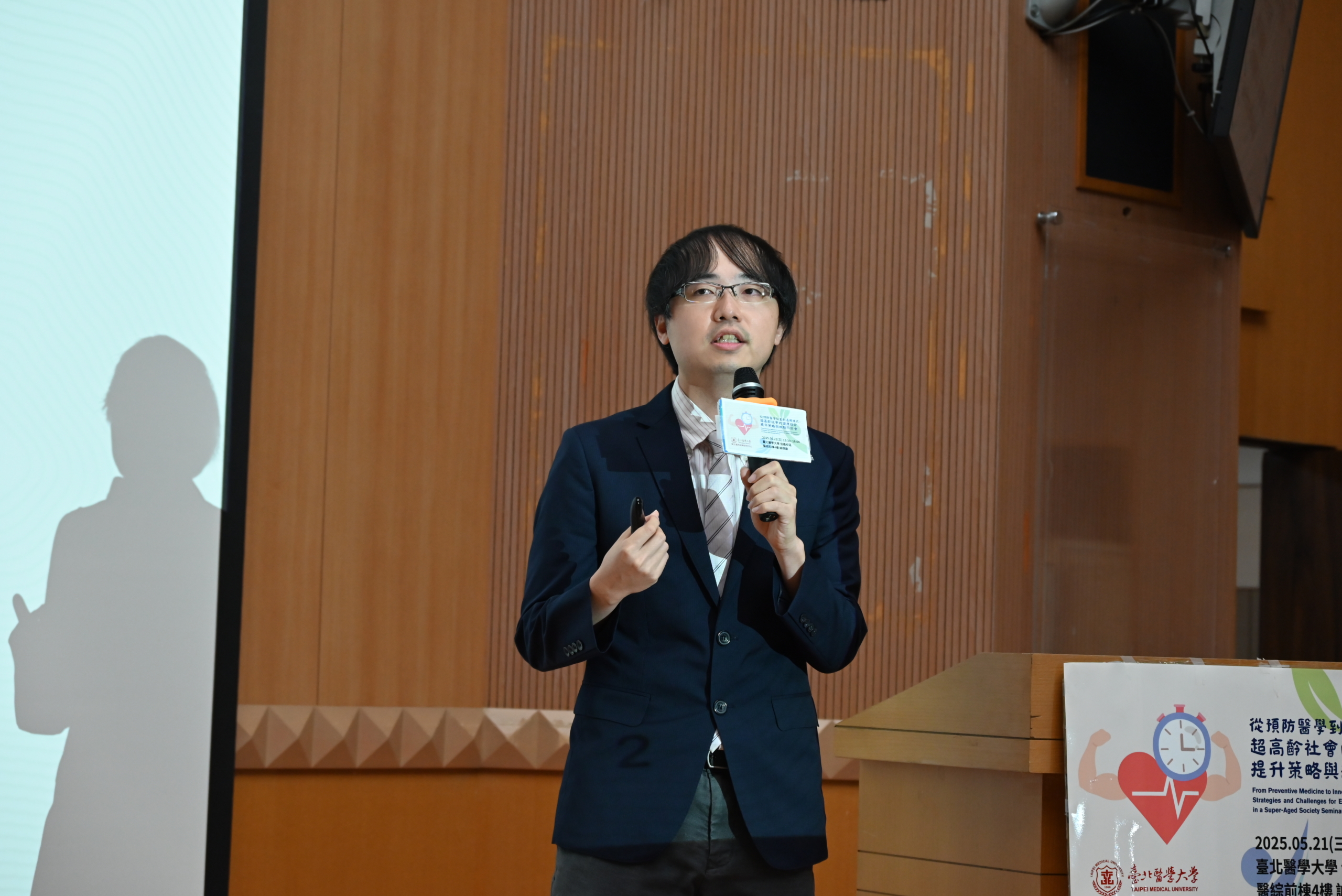
Director Liao noted that over 80% of Taiwanese seniors have chronic illnesses, often accompanied by polypharmacy and frailty, severely affecting their quality of life and care costs. The real challenge is not aging itself, but aging without health. As of 2021, the gap between average life expectancy and healthy life expectancy in Taiwan is 6.5 years. Extending healthy life expectancy is therefore a top priority, and preventive medicine is the most effective strategy. Liao cited two studies: a 2023 American Society for Nutrition study showed that adequate exercise, no smoking, moderate alcohol consumption, a plant-based diet, painkiller moderation, stress relief, quality sleep, and positive social relationships could extend lifespan by 24 years. A 2024 TMU study found that regular exercise, no smoking, moderate drinking, more fruit and vegetables, and a healthy weight could extend life by seven years, demonstrating the power of preventive medicine. In practice, preventive medicine is widely applied among seniors, including treatment of sarcopenia and frailty, and cognitive and behavioral assessments. Liao advocated for implementing the Comprehensive Geriatric Assessment (CGA) using the DEEP IN framework to systematically assess cognition, nutrition, sensory function, medication, and psychosocial aspects. He also recommended widespread sarcopenia screening (e.g., calf circumference, grip strength, walking speed), paired with exercise and diet interventions. Highlighting the importance of mental health and social support, he called for tools like the Mini-Cog and PHQ-9 to be included in elderly health exams, and for the development of community-based activity and support platforms. Liao concluded that the elderly should be viewed not as a burden, but as valuable assets to society—capable of living independently and with dignity when properly supported.
Executive Director Wu Hsiao-Chi, Taiwan Long-Term Care Professional Association

Executive Director Wu stated that population aging and declining birthrates are common challenges among industrialized nations, with the population aged 85 and older growing rapidly. Based on the WHO concept of “Active Aging,” action should be taken in three areas: health promotion, social participation, and security. Wu emphasized that active aging is a nationwide movement that spans healthcare, family, and policy sectors. She called for joint efforts between the government and civil society to implement a “Health in All Policies” approach—integrating health considerations into urban planning, transportation, education, and employment. Specific strategies include establishing “Silver Fitness Clubs,” strengthening medical capacity in communities and rural health centers, cultivating multidisciplinary care talent, using AI and big data to optimize care resource allocation, and adopting WHO’s ICOPE model to provide person-centered systematic care. She also stressed the need to create age-friendly public spaces that encourage older adults to leave their homes. Drawing from international experiences such as Finland’s, she suggested age-stratified policies to delay disability and reduce long-term care burdens—lessons Taiwan should learn from. Wu concluded that by combining healthcare, long-term care, social welfare, and AI technology, Taiwan can build a care system that is health-oriented, community-friendly, and integrated—reducing burdens on families and public finances while gradually achieving the vision of healthy aging for all.
Policy Recommendations
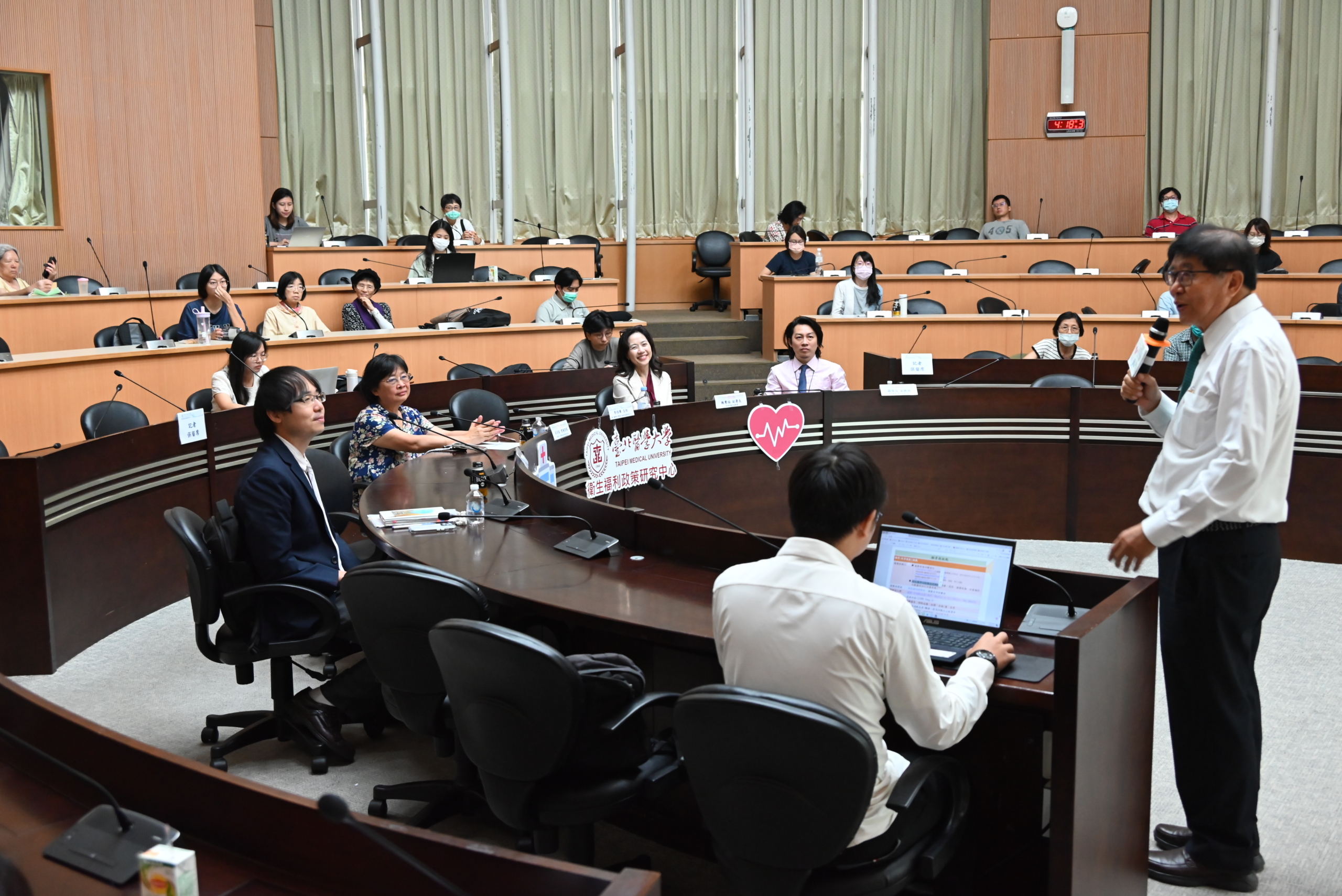
-
Integrate Health-Adjusted Life Expectancy (HALE) and Disability-Adjusted Life Years (DALY) into Policy Metrics
Incorporate comprehensive health indicators such as Health-Adjusted Life Expectancy (HALE) and Disability-Adjusted Life Years (DALY) into the foundation of health policy and resource allocation, replacing the use of single measures like life expectancy or mortality rates. Establish a localized health monitoring framework with long-term tracking capabilities to enhance the quantifiability and scientific basis of policy effectiveness. -
Promote Comprehensive Geriatric Assessment (CGA) and the WHO ICOPE Model
Actively promote the use of Comprehensive Geriatric Assessment (CGA) and the WHO’s Integrated Care for Older People (ICOPE) model. Incorporate mental health screening tools—such as the Mini-Cog and PHQ-9—into the routine health check-ups for older adults. Additionally, promote the use of sarcopenia screening tools in community and primary care settings to enable early detection and timely intervention. -
Advocate Evidence-Based Healthy Behaviors That Extend Life by Seven Years
Vigorously advocate for health behaviors proven to extend life expectancy by up to seven years—such as not smoking, engaging in regular physical activity, maintaining a balanced diet, achieving a healthy weight, ensuring good sleep, and fostering social connections—to improve public health literacy. Promote preventive medicine in everyday environments to extend healthy life expectancy and reduce the risks of chronic disease and disability at the source. -
Implement the “Health in All Policies” (HiAP) Approach
Promote the concept of Health in All Policies (HiAP) by integrating health considerations into urban planning, transportation, education, housing, and employment policies. Establish senior-friendly fitness centers and local health promotion hubs, enhance family support systems, and design age-friendly community spaces to encourage older adults to engage socially and maintain both physical and mental well-being. Draw on international experiences such as those in Finland to design age-stratified policies that delay disability and ease the burden on long-term care systems. -
Establish Cross-Sector and Cross-Disciplinary Collaboration Mechanisms
Create collaborative mechanisms that integrate healthcare, long-term care, social welfare, and technology. Leverage artificial intelligence (AI), big data, and smart health systems to improve early warning capabilities and the efficiency of care resource allocation. Develop a long-term care system based on the principles of “healthy cities, age-friendly communities, and integrated services,” aiming to achieve the societal goal of healthy aging.
Related News Reports
-
May 21, 2025 – Taiwanese Have an Average of 8 Years of Unhealthy Life Expectancy; Experts Say Reversal Depends on Smart Spending and 5 Key Health Behaviors, United Daily News
https://udn.com/news/story/7266/8755481# -
May 21, 2025 – From Preventive Medicine to Innovative Long-Term Care Models: TMU Leads the Future of Health, Economic Daily News
https://money.udn.com/money/story/5724/8755957 -
May 22, 2025 – 80% of People Over 65 Have Chronic Diseases! How Can a Super-Aged Society Improve “Healthy Life Expectancy”?, HEHO News
https://heho.com.tw/archives/356570 -
May 22, 2025 – TMU’s Health and Welfare Policy Research Center Hosts Forum on “Strategies and Challenges for Enhancing Healthy Life Expectancy in a Super-Aged Society”, WinNews
https://www.winnews.com.tw/228404/ -
May 22, 2025 – TMU’s Health and Welfare Policy Research Center Hosts Forum on “Strategies and Challenges for Enhancing Healthy Life Expectancy in a Super-Aged Society”, iTech News
https://www.itech.tw/3302

